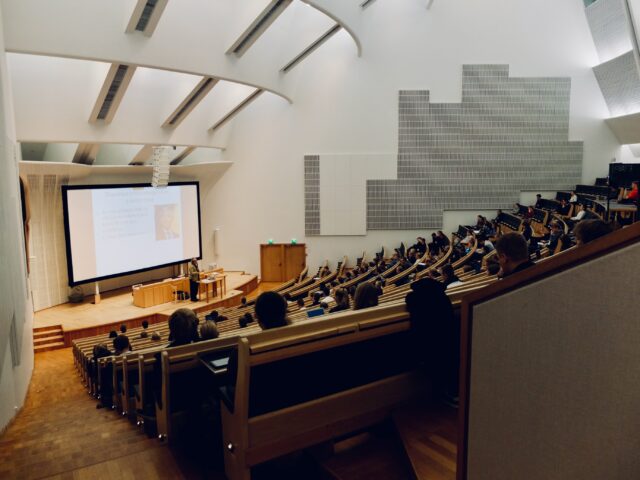Postsecondary institutions in several parts of the country are using today’s solar eclipse as an educational opportunity for their surrounding communities. Cégep Limoilou, Saint Mary’s University, and the University of British Columbia have joined the group of institutions that are hosting public eclipse viewing events and passing out special protective glasses (and in UBC’s case, edible pin-hole cameras). Brock University’s library has also prepared a collection of “Cosmic Reads” books and videos for people to learn more about eclipses. The University of New Brunswick has partnered with Space Physics Laboratory to install specialized Global Navigation Satellite Systems at 15 schools across the province, which will collect atmospheric data during the eclipse for further analysis.

Top Ten News
April 8, 2024
The University of Winnipeg says that sensitive personal information from some staff members and students was likely stolen during the recent cyberattack. The university released a list of groups that were most likely to have been affected and added that UWinnipeg will offer two years of credit monitoring to those individuals. “Rest assured that we will carefully consider the results of our investigation with a commitment to emerge from this incident with stronger cyber defences,” read a release from the university.
The Government of Québec is investing $109M in universities and research centres, which will complement funding from the Canada Foundation for Innovation and support a total of 36 innovation projects across the province. This funding aims to advance QC’s research community by fostering its development and help institutions acquire state-of-the-art equipment for their innovative initiatives. The recipients include institutions such as Concordia University, McGill University, Polytechnique Montréal, Université Laval, Université de Sherbrooke, and several members of the Université du Québec network.
The Government of Saskatchewan has provided an update on its allocation of international student study permit applications from the Government of Canada. SK’s allocation has increased to 15,054 from its original allocation of 12,000 announced in February. According to SK, this update takes the province’s historical acceptance rate into account and could result in a total of 7,200 study permits granted for the year. SK has also launched an automated provincial attestation letter (PAL) processing system using MyCreds and says it is one of the first provinces to do so.
In a recent opinion piece for The Conversation, Deena Kara Shaffer (Toronto Metropolitan University) discusses how students must be taught how to learn in order to improve student retention rates. Students who were preparing to enter postsecondary education during the pandemic often demonstrate notable learning gaps, explains Shaffer, including gaps in their understanding of how to learn from a university-level course structure. The author writes that these students benefit from initiatives that help them to develop their learning strategies for planning and prioritization, note-taking, studying and test-taking, and research and groupwork. Shaffer writes that more explicit education on how to learn could help improve student retention across the institution.
Student advocates at the University of Alberta are taking action to combat what has been dubbed the loneliness epidemic. The “It Starts With Hello” campaign seeks to promote social engagement and foster meaningful connection among students. As part of the project, several new seating areas have been installed across UAlberta’s campus in south Edmonton; the areas are accompanied by posters that include conversation prompts, games, and other resources. “Creating these spaces for students to organically interact, it’s truly so, so vital in developing that connection,” said UAlberta first-year student Nathanael Ip, who is also VP of Outreach for the Friends Across Campus Club. “Because that is, a lot of the times, the biggest barrier. It’s just the hello.”
Northern College has reaffirmed its ongoing partnership with Interfor to advance the talent pipeline in the forestry sector. Under a new Memorandum of Understanding, the parties will reaffirm teaching partnerships, foster recruitment and employment initiatives, lead applied research, facilitate coop placements, and coordinate on curriculum support and scholarship offerings. “[We] strive to create an educational environment for students that is informed by industry, creating work-ready graduates in each of our programs,” said Northern College President Mitch Dumas. “Memorandums of Understanding like this one with Interfor help us achieve that, providing fertile ground for mutual growth that will benefit all parties involved, as well as strengthening the regional economy.”
The University of Calgary’s Quantum City has entered a non-binding letter of intent with the venture capital firm QAI Ventures. The proposed collaboration will establish the QAI Ventures Accelerator, powered by Quantum City, which will build and promote Alberta’s quantum ecosystem. The accelerator will achieve this by providing entrepreneurs with access to cutting-edge technology, expert guidance, and tailored mentorship as they take their projects from the lab to the market. “Through this partnership, we’ll be able to speed up the process for [start-ups] with innovative ideas to develop their projects into marketable solutions for tomorrow’s problems,” said UCalgary VP (Research) Dr William Ghali.
Saint Mary’s University’s engineering programming will soon move to a new, more spacious home on campus. SMU shared that it intends to design a new facility over the spring and summer in preparation for the engineering department. The expansion will enhance teaching and learning by providing workspaces for students to design engineering projects and state-of-the-art labs for both students and faculty to use. The new location will enable SMU to grow its engineering program from 240 to 320 students over the next two academic years.
Peterborough Police Service are investigating two reported break-ins and the theft of tools from Trent University’s carpentry shop. According to Global News, Trent employees discovered that tools were missing from the carpentry shop last week. A review of security footage showed that an individual had entered the building and left with tools; further review found that a person had also previously removed tools from the building in late March. The estimated value of the items stolen across both instances is over $5K.
